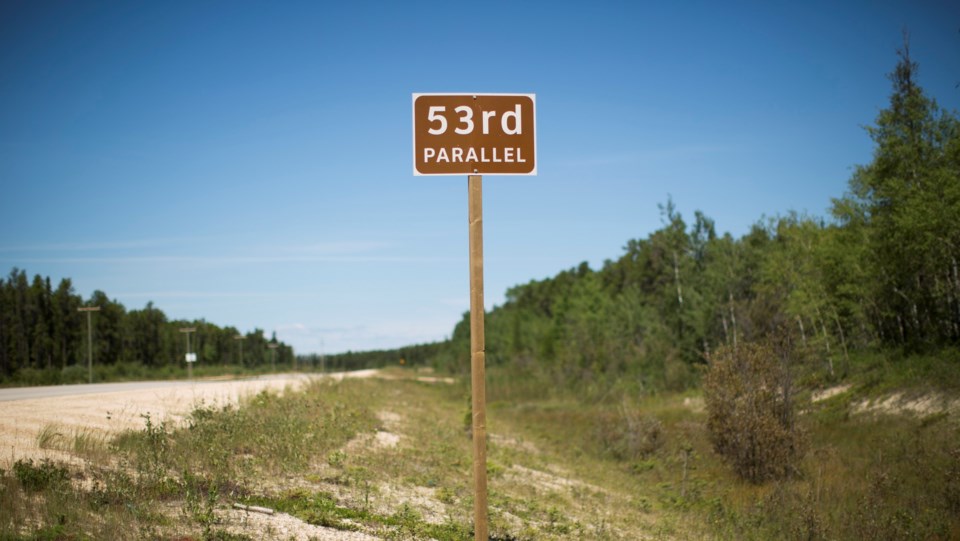Travel to Northern Manitoba and communities without all-weather road access will be restricted from April 17 to May 1 as part of the provincial government’s COVID-19 pandemic response.
Exceptions to the travel ban will include people who travel north for employment, those who are delivering goods and services, those who need to travel to the region for medical treatment and people who need to travel north of the 53rd parallel to fulfill the requirements of child-custody arrangements.
“This will help protect the region where the spread of the virus could significantly impact that population,” said chief provincial public health officer Dr. Brent Roussin at an April 16 press conference. “We’re protecting the northern communities and remote communities more at risk.”
The travel ban would not prevent Northern Manitobans who travel south from returning home, though all non-essential travel is discouraged at this time.
“Northern residents are always allowed to return home,” said Roussin.
Enforcement could include highway checkpoints, Roussin said, but getting the message out is the most important strategy.
“There’s nothing definite right now about what those are going to look like,” Roussin said, referring to possible checkpoints. “We know most Manitobans follow advice, they follow orders.”
“Today’s announcement is an important step and the result of public pressure making it clear that our region is very vulnerable and that key steps must be taken to keep our region safe,” said Churchill-Keewatinook Aski MP Niki Ashton. “This is a start. There continue to be gaps, however, as mines and work camps rely on outside contractors for work who are exempt from this restriction. We must also make sure that businesses that rely on visitors and seasonal workers that rely on tourism are supported going forward. We want people to visit our North once we’re through this - until then let’s see our governments take decisive action to keep Northern communities and First Nations safe.”
“This is an extremely important measure to help reduce the spread of the COVID-19 virus to First Nations in Northern Manitoba,” said Manitoba Keewatinowi Okimakanak (MKO) Grand Chief Garrison Settee in an April 16 press release. “We currently have no cases of COVID-19 in our MKO First Nations and our leaders are doing everything within their power to prevent the introduction of this virus into our communities. Northern First Nations are particularly vulnerable to this virus as we lack health care infrastructure, have understaffed nursing stations, and lack housing that would better enable us to implement safety measures. More than two weeks ago the chief and council of the Misipawistik Cree Nation created a check stop on Highway 6, which runs through their First Nation. Along with other Northern First Nations, they called for the closure of non-essential travel to Northern Manitoba due to their clear understanding that we need to take as many measures as we can to stop this virus from spreading during this unprecedented situation.”
MKO’s press release also said that Indigenous Services Canada reported that Indigenous Services Canda said 692 First Nations people had been tested for COVID-19 as of April 14 and that all those tests have come back negative.
Four new cases of COVID-19 in Manitoba were reported April 16, bringing the province’s total to 250 since the first positive test March 12. There are still only three cases in the Northern Regional Health Authority area and the number of cases listed as recovered - 121 - is nearly as high as the number of active cases, which is currently 124. Eight people are currently hospitalized in Manitoba due to COVID-19, four of them in intensive care. Five people have died from the virus in Manitoba.
Roussin also said that anyone entering Manitoba, whether from another country or another province, must now isolate themselves for 14 days after arrival.
“The ongoing risk is reimportation of the virus,” Roussin said.
Manitoba’s chief nursing officer highlighted the efforts of employees at the Thompson clinic who raised $1,200 and collected large bins of food for the Salvation Army food bank in the city, which has seen 24 new requests for food bank assistance this month, much higher than the normal level of three or four requests per month.
The Northern Manitoba travel ban should not have any effect on Vale’s Manitoba Operations, as new external contractors from outside the province have not been allowed on company property since March 23. Manitoba Hydro’s under-construction Keeyask generating station scaled back operations in March, with about 600 employees voluntarily remaining at the site and travel in and out of the camp suspended.




